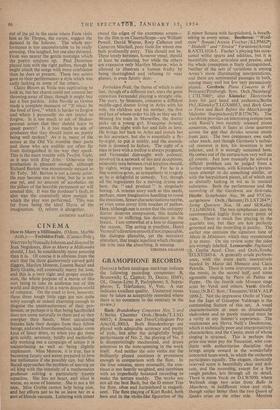CINEMA
How to Marry a Millionaire. (Odeon, Marble Arch.)—Forbidden Fruit. (Cameo-Poly.) WRITTEN byNunnallyJohnson and directed by Jean Negulesco, How to Marry a Millionaire should, I feel, be considerably more amusing than it is. Of course it is obvious from the start that the three glamorously curved gold diggers, Marilyn Monroe, Lauren Bacall and Betty Grable, will eventually marry for love, and this is a very right and proper conclu- sion, the whole purpose of a movie of this sort being to take its audience out of this world and deposit it in a warm dream-world of romance. On the road to love, however, these three tough little eggs are not quite witty enough or indeed charming enough to disguise the unattractiveness of their pro- fession, or perhaps it is that being hardboilgd does not come naturally to them and so they overplay their hands. Most calculating females hide their designs from their fellow beings, and even from themselves, under some kind of fancy dress, so when you get three girls coldly, seriously, baldly and methodic- ally working out a campaign of action it is unconvincing as well as being slightly unpleasant. Miss Monroe, it is true, has a becoming fatuity and seems prepared to love her millionaire if she possibly can, but Miss Bacall approaches the problem of snaring an oil king with the intensity of a mathematics professor solving a particularly knotty equation. She has no heart, and what is worse, no sense of humour. She is not a bit nice. Miss Grable cannot help being nice, and her efforts not to be so leave her in a tort of blonde vacuum. Loitering with intent round the edges of the enormous screen— for the film is on CinemaScope—are William Powell, David Wayne, Rory Calhoun and Cameron Mitchell, poor fools for whom one feels profoundly sorry. This should not be. Three lovely heroines, however venal, should at least be endearing, but while the others are expensive only Marilyn Monroe, who is allowed to illustrate a human frailty by being shortsighted and refusing to wear glasses, is even faintly dear. * * Forbidden Fruit, the theme of which is also lust, though of a different sort, stars the great comedian Fernandel playing a straight role. The story, by Simenon, concerns a diffident middle-aged doctor living in Arles with his wife, his children and his mother, the first and last of whom order his life as they see fit. Missing his train in Marseilles, the doctor picks up a young girl, Frangoise Arnoul,. spends the night with her and falls in love. He brings her back to Arles and instals her as his secretary, but she is essentially a fly- by-night, to put it mildly, and the associa- tion is doomed to failure. The sight of a man in love with a trollop is always poignant, and Fernandel distraught with jealousy, involved in a network of lies and deceptions, miserably torn between rival loyalties should, by rights, wring every heart. For he is a fine sensitive actor, as sympathetic in tragedy as he is delightful in comedy. Yet, though all the ingredients for a moving drama are here, the " end product " is singularly boring. A veteran story such as this needs, perhaps, more imaginative handling to rouse the emotions, firmer characterisations maybe, or even some corny little touches of pathos. Here, although one is aware that the unhappy doctor deserves compassion, this laudable response to suffering lies dormant in the breast. I am somewhat at a loss to diagnose the reason. The acting is excellent, Henri Verneuil's direction smooth if not impeccable, the dialogue plausible, yet the necessary stimulant, that magic injection which changes the trite into the absorbing, is missing.
VIRGINIA GRAHAM


































 Previous page
Previous page